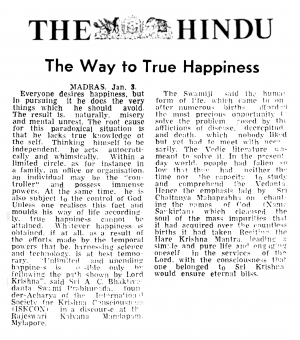The Way to True Happiness
This article, "The Way to True Happiness," was published in The Hindu, January 3, 1976, in Chennai, India.
MADRAS, Jan. 3.
Everyone desires happiness, but in pursuing it he does the very things which he should avoid. The result is, naturally, misery and mental unrest. The root cause for this paradoxical situation is that he lacks true knowledge of the self. Thinking himself to be independent, he acts autocratically and whimsically. Within a limited circle, as for instance in a family, an office or organization, an individual may be the "controller" and possess immense powers. At the same time, he is also subject to the control of God. Unless one realizes this fact and molds his way of life accordingly, true happiness cannot be attained. Whatever happiness is obtained, if at all, as a result of the efforts made by the temporal powers that be, harnessing science and technology, is at best temporary. "Unlimited and unending happiness is possible only by following the path shown by Lord Krishna", said Sri A. C. Bhaktivedanta Swami Prabhupada, founder-Acharya of the International Society for Krishna Consciousness (ISKCON) in a discourse at the Rajeswari Kalyana Mandapam, Mylapore.
The Swamiji said the human form of life, which came to on after numerous births, afforded the most precious opportunity to solve the problem, posed by the afflications of disease, decrepitude and death, which nobody liked but yet had to meet with necessarily. The Vedic literature was meant to solve it. In the present day world, people had fallen so low that they had neither the time nor the capacity to study and comprehend the Vedanta. Hence the emphasis laid by Sri Chaitanya Mahaprabhu on chanting the names of God (Nama Sankirtan), which cleansed the soul of the mass impurities that it had acquired over the countless births it had taken. Reciting the Hare Krishna Mantra, leading a simply and pure life and engaging oneself in the services of the Lord, with the consciousness that one belonged to Sri Krishna would ensure eternal bliss.
